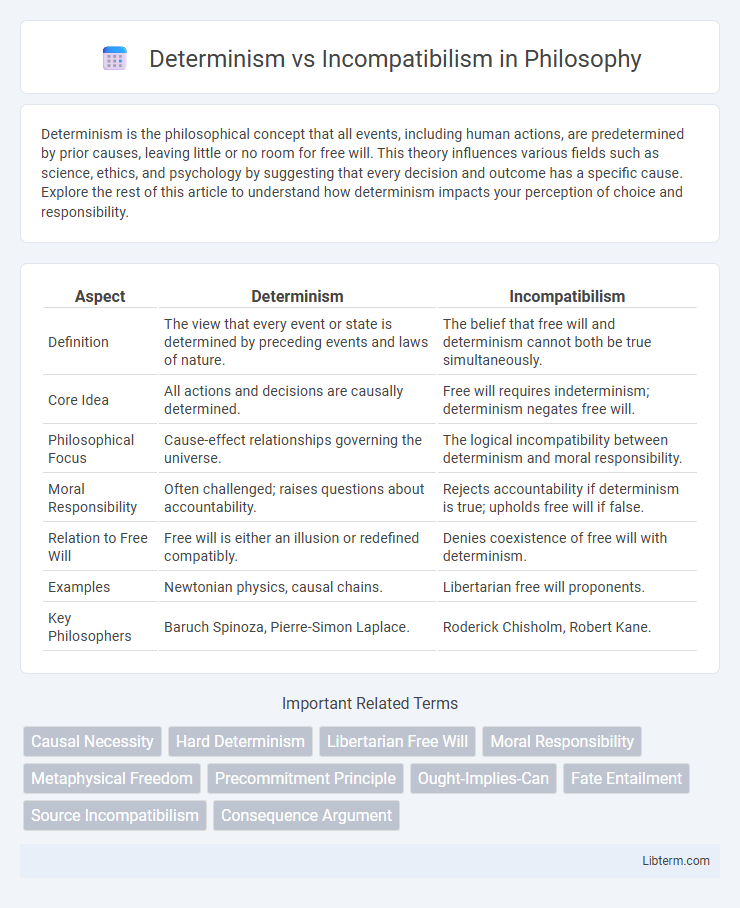Determinism is the philosophical concept that all events, including human actions, are predetermined by prior causes, leaving little or no room for free will. This theory influences various fields such as science, ethics, and psychology by suggesting that every decision and outcome has a specific cause. Explore the rest of this article to understand how determinism impacts your perception of choice and responsibility.
Table of Comparison
| Aspect | Determinism | Incompatibilism |
|---|---|---|
| Definition | The view that every event or state is determined by preceding events and laws of nature. | The belief that free will and determinism cannot both be true simultaneously. |
| Core Idea | All actions and decisions are causally determined. | Free will requires indeterminism; determinism negates free will. |
| Philosophical Focus | Cause-effect relationships governing the universe. | The logical incompatibility between determinism and moral responsibility. |
| Moral Responsibility | Often challenged; raises questions about accountability. | Rejects accountability if determinism is true; upholds free will if false. |
| Relation to Free Will | Free will is either an illusion or redefined compatibly. | Denies coexistence of free will with determinism. |
| Examples | Newtonian physics, causal chains. | Libertarian free will proponents. |
| Key Philosophers | Baruch Spinoza, Pierre-Simon Laplace. | Roderick Chisholm, Robert Kane. |
Understanding Determinism: Core Principles
Determinism posits that every event or state is causally determined by preceding events according to natural laws, implying a fixed chain of cause and effect. This principle asserts that given the universe's initial conditions and physical laws, all future outcomes are predetermined and inevitable. Understanding determinism is crucial to evaluating the compatibility of moral responsibility and free will within philosophical debates on incompatibilism.
Defining Incompatibilism in Philosophy
Incompatibilism in philosophy asserts that free will and determinism cannot coexist, maintaining that if determinism is true, humans lack genuine freedom to choose otherwise. This position contrasts with compatibilism, which argues that free will is compatible with deterministic causal laws. Incompatibilism is central to debates on moral responsibility, emphasizing that true accountability requires the ability to act independently from predetermined causes.
Historical Roots of the Debate
The debate between determinism and incompatibilism traces back to ancient philosophical inquiries by thinkers like Democritus and Epicurus, who explored causality and free will. During the Enlightenment, philosophers such as David Hume and Immanuel Kant further examined the tension between causal determinism and moral responsibility. This historical discourse laid the foundation for contemporary discussions on whether free will can coexist with a deterministic universe.
Key Arguments for Determinism
Determinism asserts that every event, including human actions, is causally determined by prior states of the universe according to natural laws, negating genuine free will. Key arguments for determinism include the causal chain principle, which emphasizes that all phenomena have identifiable causes, and scientific evidence from physics and neuroscience indicating predictable patterns governing behavior. This perspective challenges the notion of moral responsibility by suggesting choices are predetermined rather than freely made.
Central Claims of Incompatibilism
Incompatibilism asserts that free will and determinism cannot coexist, claiming that if determinism is true, every event is necessitated by preceding causes, eliminating genuine choice. Central to incompatibilism is the argument that moral responsibility requires the ability to have acted otherwise, which determinism negates. This position underscores the incompatibility between a deterministic universe and autonomous human agency.
Free Will: Caught in the Crossfire
Determinism asserts that all events, including human choices, are causally determined by preceding factors, challenging the existence of free will. Incompatibilism holds that if determinism is true, free will cannot exist, creating a philosophical conflict over moral responsibility. This clash positions free will as caught in the crossfire between predetermined causality and the demand for autonomous agency.
Prominent Philosophers and Their Positions
Prominent philosophers such as Daniel Dennett argue for compatibilism, asserting that free will can coexist with determinism, while incompatibilists like Peter van Inwagen maintain that if determinism is true, free will cannot exist. Incompatibilism is also supported by philosophers like Robert Kane, who emphasize the importance of indeterminism for genuine moral responsibility. These contrasting positions highlight the enduring debate surrounding the reconciliation of human freedom with causal determinism in philosophical discourse.
Criticisms and Counterarguments
Determinism, which posits that all events are causally determined by preceding factors, faces criticism for allegedly undermining moral responsibility by denying free will. Incompatibilism argues that if determinism is true, free will cannot exist, but critics challenge this by proposing nuanced definitions of freedom that coexist with causal determinism. Counterarguments emphasize interpretative frameworks like soft determinism, which reconcile determinism with moral accountability by redefining freedom as the capacity to act according to one's desires without external coercion.
Implications for Ethics and Responsibility
Determinism challenges traditional notions of ethical responsibility by suggesting that all actions are predetermined by prior causes, potentially undermining moral accountability. Incompatibilism asserts that if determinism is true, free will cannot exist, thereby questioning the justification for praise or blame. This perspective forces a reevaluation of legal and moral systems, emphasizing the need to consider causality when assigning responsibility.
Moving Forward: The Future of the Debate
The future of the Determinism vs Incompatibilism debate hinges on advances in neuroscience and quantum physics that challenge traditional notions of causality and free will. Emerging research on brain activity preceding conscious decisions may reshape arguments about moral responsibility and agency. Philosophers and scientists increasingly collaborate to reconcile deterministic frameworks with compatibilist theories, potentially forging new paradigms for understanding human autonomy.
Determinism Infographic

 libterm.com
libterm.com